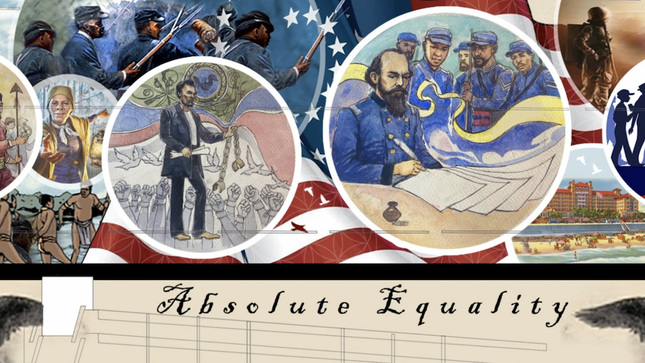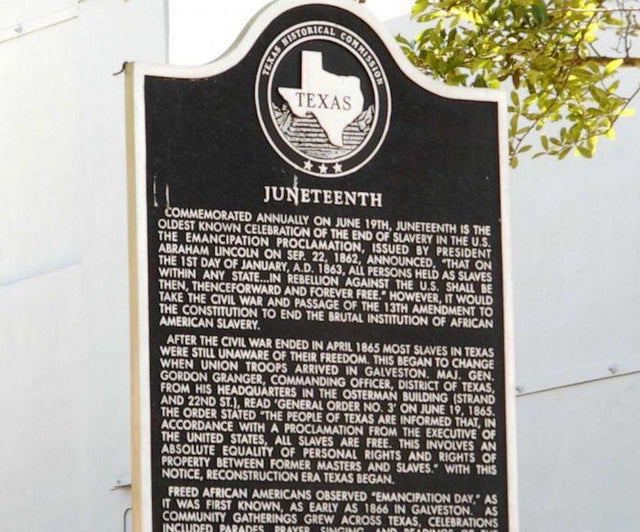A Brief History of Juneteenth and What It Means Today
A portmanteau of “June” and “nineteenth”, Juneteenth, also known as Freedom Day or Emancipation Day, marks the date in 1865 that word of the end of chattel slavery in the Confederacy reached Galveston in Texas thanks to the arrival of Union army Major General Gordon Granger. In actuality, the official end of slavery had occurred years before, when President Abraham Lincoln signed the Emancipation Proclamation into law in 1863. The reason for the years-long lateness in Texas? The state did not surrender to Union troops during the Civil War, therefore 250,000 people in Texas had no idea their enslavement was no longer legal, until two months after the war ended. The newly freed celebrated their liberation with joyful festivities that came to be known as Juneteenth.
Since then, Juneteenth has been celebrated annually in Texas, as well as other cities and towns around the United States, such as Louisiana, Oklahoma and California, as Black Texans moved around the country. The celebrations were usually a gathering of local community members with parades, dances, sporting events and, of course, food and drink in the signature red colour.
“Juneteenth is a day of freedom,” says Nana Agyemang, multimedia journalist and CEO of EveryStylishGirl and our former Observations subject. “I will be at barbecues, drinking red punch, dancing and laughing with my beautiful Black and Brown friends.”

The road to liberation had been a long one. In 1861, the Civil War that erupted between the Southern states that seceded to form the confederacy and the rest of the United States (or the Union) began, dividing the country into either opponents or advocates for slavery. The following year, the US Congress abolished slavery and passed the Confiscation Act authorizing the seizure of Confederate property, which included their slaves. In January 1863, the Emancipation Proclamation was affirmed by President Lincoln, liberating millions of slaves in the United States. Some Confederate-friendly states were initially exempt from this ruling, until the 13th amendment was passed in 1864, banning slavery in all states, both Union and Confederate. It took until December 1865 for the law to be fully realized across the nation, when the very last people held in slavery were freed from indentured servitude.
But, 155 years later, Juneteenth – and the event it commemorates – gained even more prominence and relevance. After the murder of George Floyd sparked protests and racial justice movements in the summer of 2020, many Americans became aware of Juneteenth and its existence for the first time, which ignited calls for the date to be recognized as a national holiday.
Over the years, Juneteenth came to have many meanings and iterations and varying levels of importance, through different moments of American history: Reconstruction, Jim Crow, both world wars, the Great Depression, the Civil Rights Movement and police brutality. In the face of racism, inequality and white supremacist laws, Black Americans descended from slavery would gather to celebrate and remember the attainment of freedom and hope for an equal and just future to come. Many Black Americans would discreetly take the June 19 off work each year to spend with family and friends, their white employers and colleagues none the wiser.

Juneteenth became “a holiday of significance” in the state of Texas in January 1980, and soon, other states followed a total of 48, as well as Washington DC. The events of 2020 inspired and garnered many activists and advocates for federal acknowledgement of the day. Many corporations, such as Nike, Twitter and Uber, in a bid to be promote anti-racism, diversity and inclusion, made it a company holiday and gave their employees the day off. Due to the work of activists like as 94-year-old Texan Opal Lee and the efforts of congresswoman Rep. Sheila Lee Jackson, among others, the US House and Senate passed legislation, signed into law by President Joe Biden earlier this week on Thursday June 17 to officially make Juneteenth a national holiday.
For many, it is a long overdue acknowledgement that Black history is an integral part of American history, a history that has been long been ignored, erased and relegated from the history that is taught in schools.
“It is a day I wish would have become a federal holiday years ago,” Agyemang says. “As much joy that I feel for this day, I have a bit of dissatisfaction with the overall diversity and inclusion rate in fashion and media. I wish we would focus our efforts on providing more opportunities to Black and Brown professionals. All in all, I hope white corporations can use this day to reflect and plan ways they can improve representation in their fields.”
This year, as the Emancipation Flag flies high, and the red punch flows and the families and friends gather again, the Juneteenth celebrations will, as always, be full of hope that the connection, education and action needed to make inclusion, equity and justice for Black people in America comes to pass sooner rather than later.
Images courtesy of Getty Images, Charles Criner, Juneteenth Legacy Project

